It was just a few years ago that Flex made its move into the power tool sector with its 24V line. Now, we’re getting our hands on the first Flex 12-inch cordless miter saw.
Looking back a couple of months, we were legitimately impressed with Flex’s hybrid table saws. Like those tools, the design team did more than just slap a label on an existing product and call it a day. I’ll walk you through everything I’ve discovered over the course of my testing and help you decide if it’s worth adding to your jobsite or shop.
Pros
- Corded or cordless operation
- Strong, smooth cutting power
- No blade wobble
- Easy bevel and miter adjustments
- Easy fence and extension adjustments
- LED shadow cutline indicator
- Hands-free spindle lock for blade changes
Cons
- I’d prefer a smaller grip diameter on the handle
Flex 12-Inch Cordless Miter Saw Performance
Corded or Cordless Operation
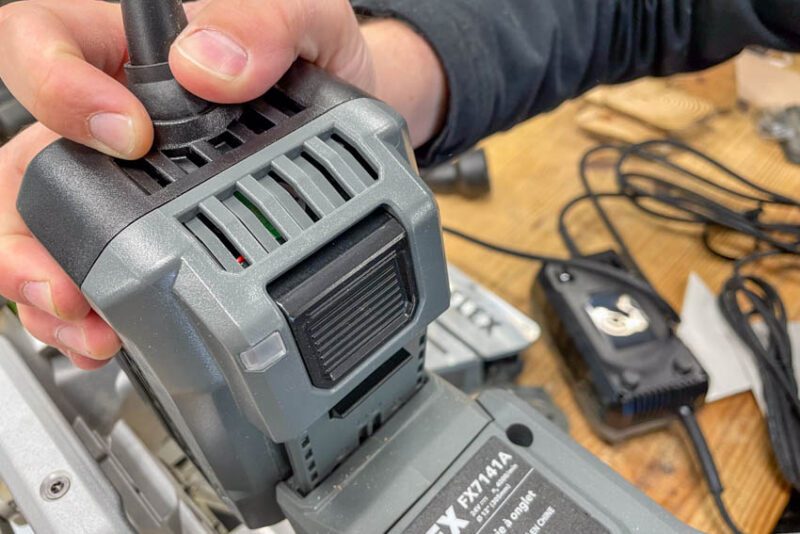
The first thing you need to know is that you can use this miter saw with a Flex 24V battery or with the same AC adapter that works with the table saws. While that kind of versatility is helpful, many first-generation cordless miter saws I’ve used have been a “it’s great to cut the cord, but…” kind of experience on the performance side.
Before I got into anything else, I made a few test cuts to see how strong the saw is. Flex kits this model with a 10.0Ah Stacked Lithium battery, so that’s what I started with. I like to use 4×4 lumber to test the power since it can push a saw’s comfort level, especially on compound cuts.
On the compound cuts, I could hear the speed begin to drop from the 4000 RPM no-load, but no more than I would expect on a 12-inch corded miter saw. In fact, I’d say that the brushless motor’s torque did a better job of keeping the tempo up than our corded models.
What really impressed me was how smooth the cuts were. Even pushing the saw hard, I felt no blade chatter with either the stock blade or switching over to the CMT Orange Tools ITK Xtreme 96T blade we use for fine finish cuts.
The AC adapter is icing on the cake, and some pretty sweet icing at that. With Flex’s battery technology offering the legitimate performance of a 15-amp corded model plus having the option for corded operation when I don’t want to manage battery capacity, it’s a saw that’s at home making the commute to jobsites or sitting stationary in your shop.
Cutting Accuracy
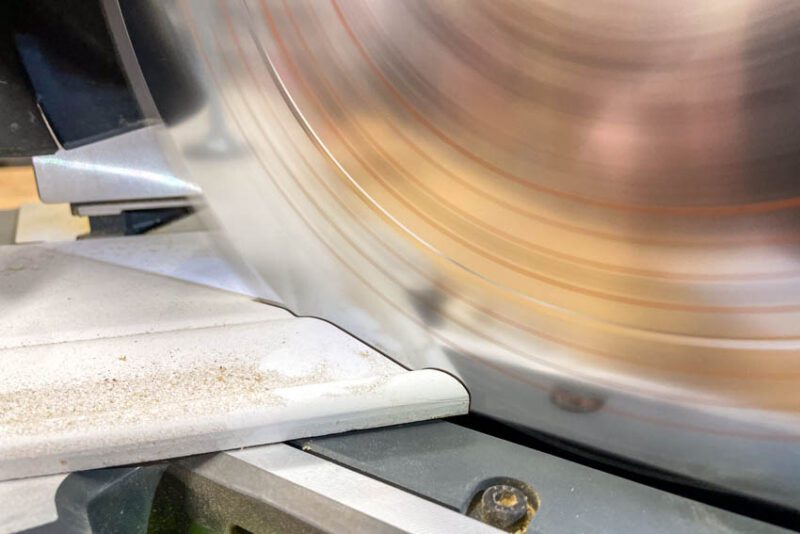

With the power question out of the way, I turned my attention to the saw’s accuracy. Anytime you get a new miter saw, you should plan on calibrating it. Most miter saws we’ve reviewed over the year are off by at least a fraction of a degree, and we always want to have a true 90° starting point.
With that task complete, I made a series of miter and bevel cuts, comparing the results on squares we know to be accurate. As long as you perform your calibration correctly (and revisit it at regular intervals), you can get nice, tight joints that won’t leave you reaching for wood filler to cover inaccuracies.
You do need to keep in mind that you can introduce some side lean in the rail system, which is common on sliding miter saws. The motor is strong, and the rails are smooth, so let the saw do the work and trust it to stay true through the cut to get accurate cuts. If you try to push hard through a cut on thicker hardwoods, you will likely lean the blade into it and waste material and time as you redo your work.
I also checked the table and back fence to see how flat and square they are. They’re not Kapex perfect, but we’re also not talking about a saw that has Kapex pricing. The imperfections are slight, and don’t introduce enough variance to throw off the quality of our cuts. Compared to other Pro-grade saws we use, it’s right in line with Bosch’s 18V ProFactor that’s been our go-to miter saw the past few years.
Flex 12-Inch Cordless Miter Saw Design Notes
Shadow Cutline Indicator
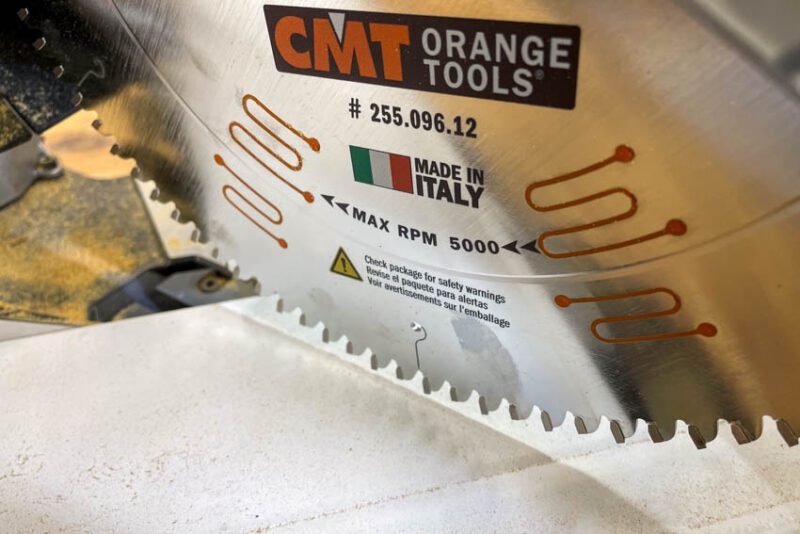

Flex uses a shadow cutline indicator, which is my preference over lasers. As you bring the blade down and the guard lifts out of the way, LED lights cast a shadow from the blade, showing you exactly where it’s going to cut. It’s far easier to line up right on the line or to the left or right of it than the laser systems we’ve used before. We also love that it doesn’t require calibration and you move from one blade to the next.
Miter Locking
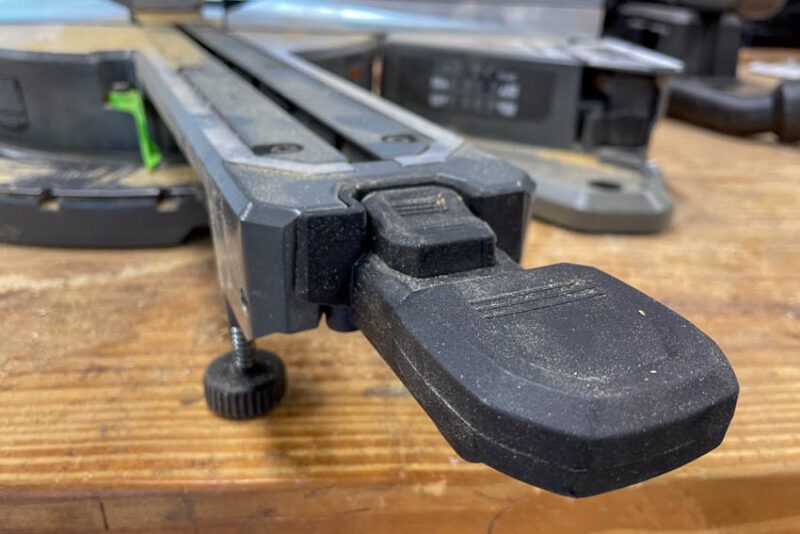

The miter locking system doesn’t stray too far from the norm, and it’s easy to use. Press the button on top to release the detent and slide to the angle you need. If it’s between detents, you secure it by pushing the miter lock down rather than twisting a knob.
As we expect, there’s an adjustable foot underneath the lock to stabilize that end of the saw.
FastShift Bevel Lever
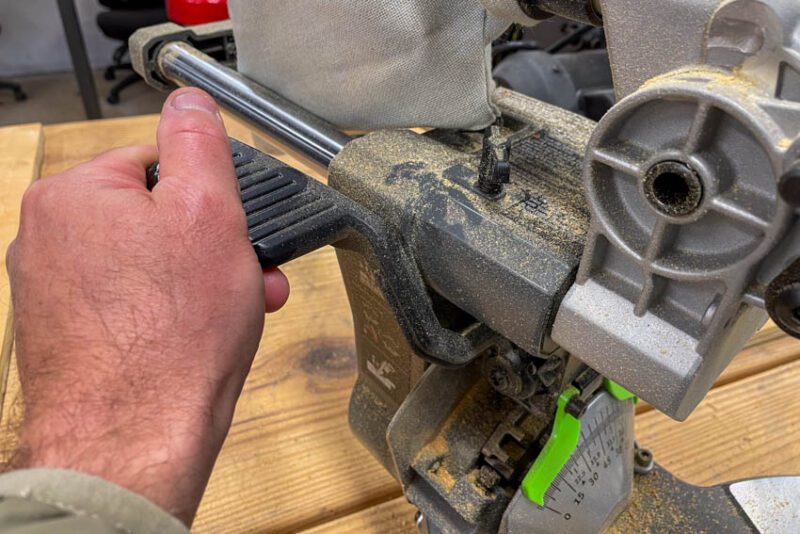

Flex made significant changes to the bevel system, and it’s a sigh of relief for those of us who hate reaching behind the saw to turn a knob. On the left, there’s a lever. When you pull it forward, you’ll feel some resistance near the end of the range. Pull it a little more, and you get your detent override. Let it go, tilt left or right, and it will settle into the next detent. Simply keep pulling forward if you want to override multiple detents.
When you need to lock it into an angle that’s not on a detent, pushing the lever all the way back secures it. Even when you’re on a detent, you should still push the lever into its fully secure position.
Blade Changes
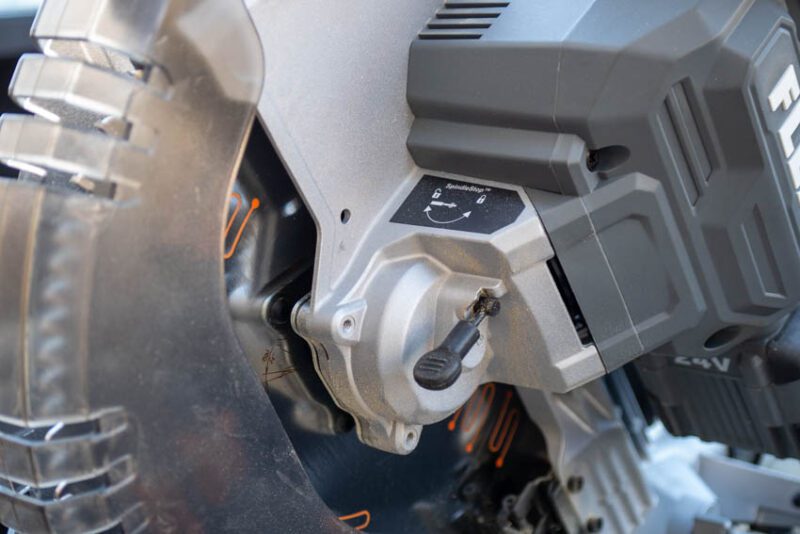

With one small lever, Flex made every other miter saw seem like it needs an upgrade. Dubbed “Spindle Stop”, you flip the lever into the lock position, turn the blade by hand until it locks, and you have two free hands to work your blade change. There’s no need to task one hand just to hold down a spindle lock button anymore.
More Easy Adjustments
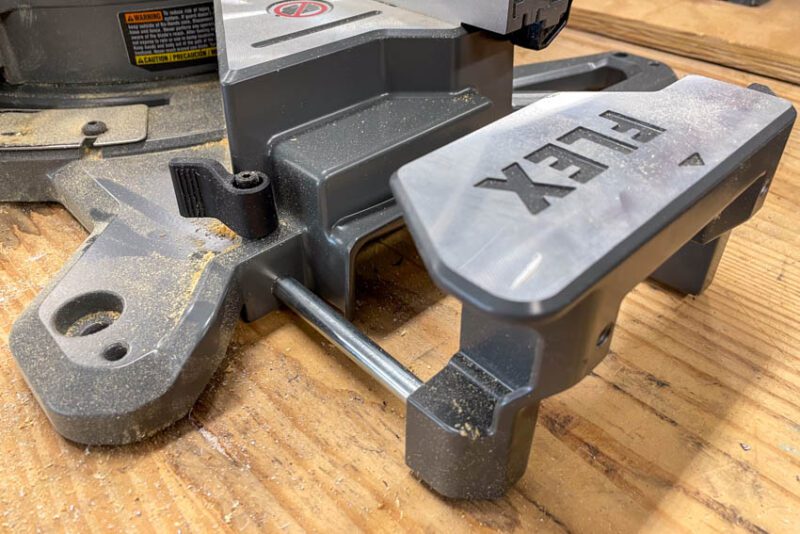

Two other adjustments worth pointing out are the built-in table extensions and fences. Both feature super-easy lever releases. Flip the lever to release the extension or fence, make the adjustment, and flip the lever back where you found it. They’re quick and easy, and a notable improvement over most miter saws we’ve used.
Additional Highlights
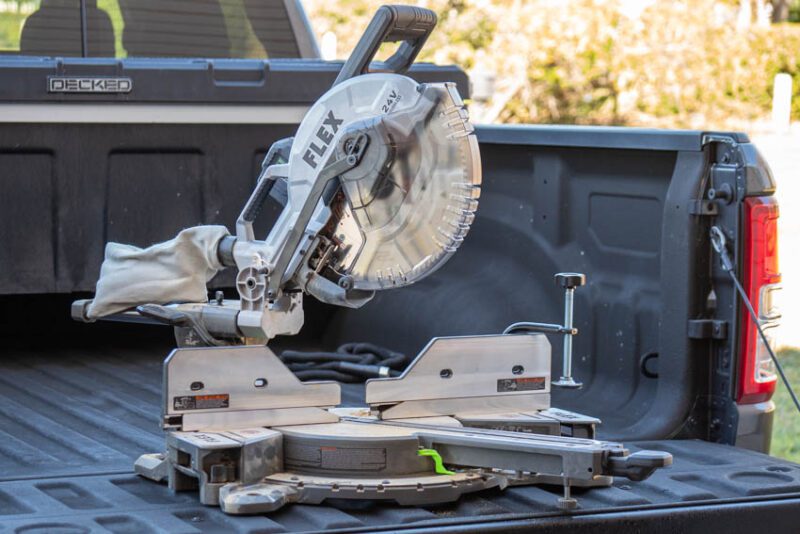

- Depth stop
- Side-by-side twin rail system
- Miter stops at 0°, 15°, 22.5°, 31.6°, and 45°
- Bevel stops at 0°, 22.5°, 33.9°, and 45°
- Includes dust bag and vac adapter
- Includes material clamp
- Onboard tool storage
- Rail lock
Considering other options? Check out our best miter saw recoomendations for the year!
Flex 12-Inch Cordless Miter Saw Price
You can order this saw for $599 as a a bare tool or $799 as a kit with a 10.0Ah Stacked Lithium battery and 280W rapid charger. If you want the AC adapter that also runs Flex’s table saws, it’s $199.
As you’re shopping, keep in mind that Flex offers a lifetime warranty if you register your purchase by December 31, 2024. Good luck finding that on any other brand’s miter saw, corded or cordless.
The Bottom Line
From hybrid power and impressive performance to helpfully innovative new features, there’s a lot to love about the Flex 12-inch cordless miter saw. If you’re already on Flex’s 24V battery system and need a miter saw, this one’s an easy decision. If you’re on the hunt for a new miter saw and cordless freedom intrigues you, we highly recommend you give Flex serious consideration.
Specifications
- Power Source: Flex 24V battery or AC adapter (Stacked Lithium battery highly recommended)
- Blade Diameter: 12 inches
- Arbor: 1 inch
- No-Load Speed: 4000 RPM
- Cross Cut Range: 14 inches
- Max Cutting Depth 3 3/5 inches
- Nested Crown Cutting Range: 6 3/4 inches on 38° crown, 7 1/2 inches on 45° crown
- Miter Range: 60° rigiht, 52° left
- Bevel Range: 48° left, 48° right
- Weight: 63.9 pounds





